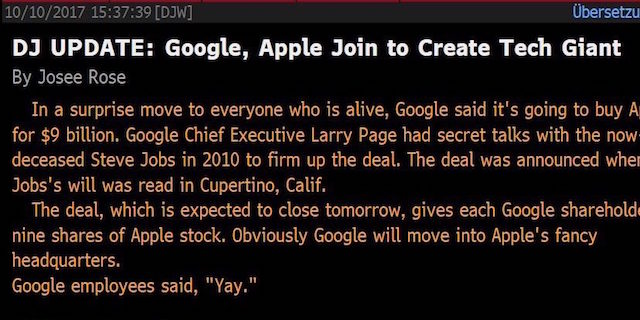Here’s what to do when Dow Jones says Google is buying Apple

Here’s a story that appeared on Dow Jones newswires yesterday:
DJ Update: Google, Apple Join to Create Tech Giant
By Josee Rose
In a surprise move to everyone who is alive, Google said it’s going to buy Apple for $9 billion. Google Chief Executive Larry Page had secret talks with the now deceased Steve Jobs in 2010 to firm up the deal. The deal was announced when Jobs’s will was read in Cupertino, Calif.
The deal, which is expected to close tomorrow, gives each Google shareholder nine shares of Apple stock. Obviously, Google will move into Apple’s fancy headquarters.
Google employees said “Yay.”
Obviously this is fake. Normally, if something appears in Dow Jones newswires, you would trust it (in this case, a “technical error” at Dow Jones caused them to post some inaccurate test headlines including this one.) So I asked myself, at what level does this fail to pass the sniff test?
- The numbers are off. Apple is the most valuable company in the world, with a market capitalization of approximately $800 billion dollars. It sells $28 billion worth of stuff every quarter. So nobody is buying it for $9 billion. Looking at the share prices, one share of Google is currently worth about the same as 6 shares of Apple; the 9-share valuation would be an insane 41% discount on those shares’ current value.
- The dates are off. Steve Jobs died in 2011. There’s no way his will would determine Apple’s fate in 2017. And no deal this large would close in one day.
- The language is off. Articles on Dow Jones newswires never say “In a surprise move to everyone who is alive” or “fancy new headquarters” or quote Google employees saying “Yay.”
- The rest of the media isn’t buying it. There’s no article in the New York Times or CNN about the acquisition (but there is about the reporting glitch.)
The news didn’t fool many humans, but it did fool some algorithms, which bought enough of Apple stock to boost the price by a couple bucks.
The skeptic’s pledge
The bad news is that the media and social media ecosystem now makes it easy for fake news to spread. (Case in point: Morgan Freeman isn’t dead, although some of my friends were spreading that news on Facebook.)
The good news is that the media and social media ecosystem now make it easy to check.
If you read something that you want to believe — something that confirms your prejudices — then you have responsibility to check it more carefully. Fake news that people want to believe is the fake news that spreads most quickly.
Is the source credible? That’s a start, but as you can see from this story, it’s not sufficient. With the speed of news these days, every news organization gets it wrong sometimes.
Is there independent confirmation? Check if people from different media outlets who have their own sources are reporting it, not just news organizations all citing the same original report.
Is there photographic or video evidence? Photos alone aren’t sufficient, but they’re credible when combined with credible reporting.
Are there logical contradictions? Learn enough about the field you’re reading about to know when numbers and dates like the ones in this Dow Jones article are off. Share prices and market capitalizations are public and easy to check.
The value of voice
I’m intrigued by the idea that we can tell immediately, regardless of the facts, that this isn’t a real article on a newswire.
News has an authoritative tone. I’ve found it frustrating, because it often gets in the way of reporters writing what they actually see or know because they need to sound like news.
Now I’m wondering. Dow Jones should sound like Dow Jones, Variety should sound like Variety, and Politico should sound like Politico. It’s another useful way to know when you’re being fooled.
Most fake news writers don’t have the training to sound like real ones. If only the algorithms had enough intelligence to pick up on that.